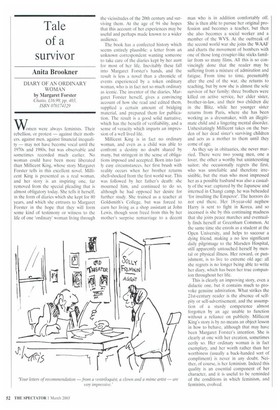Tale of a survivor
Anita Brookner
DIARY OF AN ORDINARY WOMAN by Margaret Forster Chatto, 116.99, pp. 403, ISBN 070174129 Women were always feminists. Their rebellion, or protest — against their mothers, against men, against financial inequality — may not have become vocal until the 1970s and 1980s, but was observable and sometimes recorded much earlier. No woman could have been more liberated than Millicent King, whose story Margaret Forster tells in this excellent novel. Millicent King is presented as a real woman, and her story is an inspiring one, far removed from the special pleading that is almost obligatory today. She tells it herself, in the form of diaries which she kept for 80 years, and which she entrusts to Margaret Forster in the hope that they will form some kind of testimony or witness to the life of one 'ordinary' woman living through
the vicissitudes of the 20th century and surviving them. At the age of 94 she hopes that this account of her experiences may be useful and perhaps made known to a wider audience.
The book has a confected history which seems entirely plausible: a letter from an unknown correspondent wanting someone to take care of the diaries kept by her aunt for most of her life. Inevitably these fall into Margaret Forster's hands, and the result is less a novel than a chronicle of events experienced by a token ordinary woman, who is in fact not so much ordinary as iconic. The inventor of the diaries, Margaret Forster herself, gives a convincing account of how she read and edited them, supplied a certain amount of bridging material, and prepared them for publication. The result is a good solid narrative, which has the benefit of verifiability, and a sense of veracity which imparts an impression of a well lived life.
Millicent King is in fact no ordinary woman, and even as a child was able to confront a destiny no doubt shared by many, but stringent in the sense of obligations imposed and accepted. Born into fairly easy circumstances, her first brush with reality occurs when her brother returns shell-shocked from the first world war. This was followed by her father's death: she mourned him, and continued to do so, although he had opposed her desire for further study. She trained as a teacher at Goldsmith's College, but was forced to earn her living as a shop assistant at John Lewis. though soon freed from this by her mother's surprise remarriage to a decent man who is in addition comfortably off. She is then able to pursue her original profession and becomes a teacher, but then she also becomes a social worker and a member of the WVS. At the outbreak of the second world war she joins the WAAF and charts the movement of bombers with one of those long croupier-like sticks familiar from so many films. All this is so convincingly done that the reader may be suffering from a mixture of admiration and fatigue. From time to time, presumably after the end of the war, she returns to teaching, but by now she is almost the sole survivor of her family: three brothers were killed on active service, her elder sister, brother-in-law, and their two children die in the Blitz, while her younger sister returns from Paris, where she has been working as a dressmaker, with an illegitimate child and a lingering mental disorder. Unhesitatingly Millicent takes on the burden of her dead sister's surviving children and acts as a mother to them until they come of age.
As they say in obituaries, she never married. There were two young men, one a lover, the other a worthy hut uninteresting suitor; she occasionally regrets the first, who was unreliable and therefore irresistible, but the man who most impressed her as a possible husband was also a casualty of the war: captured by the Japanese and interned in Changi camp, he was beheaded 'for insulting the Emperor'. The horrors do not end there. Her 18-year-old nephew Harry is sent to fight in Korea, and so incensed is she by this continuing madness that she joins peace marches and eventually finds herself at Greenham Common. At the same time she enrols as a student at the Open University, and helps to succour a dying friend, making a no less significant daily pilgrimage to the Marsden Hospital, still apparently untouched herself by mental or physical illness. Her reward, or punishment, is to live to extreme old age: all she regrets is no longer being able to write her diary, which has been her true companion throughout her life.
This is clearly an improving story, even a didactic one, but it contains much to provoke genuine admiration. What strikes the 21st-century reader is the absence of selfpity or self-advertisement, and the assumption of a sturdy competence almost forgotten by an age unable to function without a reliance on publicity. Millicent King's story is by no means an object lesson in how to behave, although that may have been Margaret Forster's intention. She is clearly at one with her creation, sometimes eerily so. Her ordinary woman is in fact exemplary, and her worth rather than her worthiness (usually a back-handed sort of compliment) is never in any doubt. Neither, of course, is her feminism. Indeed this quality is an essential component of her character, and it is useful to be reminded of the conditions in which feminism, and feminists, evolved.


















































































 Previous page
Previous page